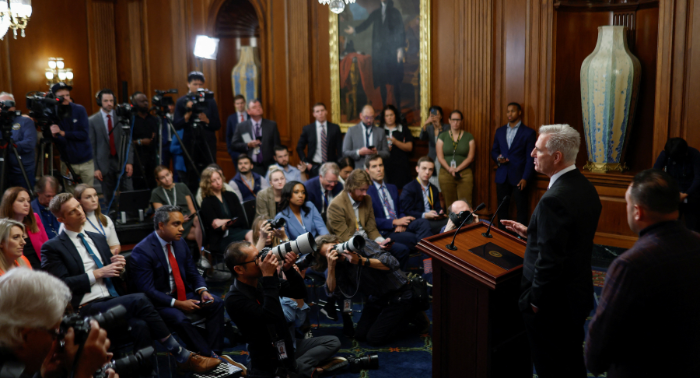The leading figures from both the Democratic and Republican parties in Congress have reached an agreement on a spending plan valued at $1.59 trillion. This agreement comes at a crucial time, as it aims to prevent a potential government shutdown this month.
Discussions and negotiations have been ongoing since early the previous year in the House of Representatives and Senate over the 12 essential bills necessary for funding the government for the fiscal year that started on October 1. These talks were initially stalled due to disagreements on the overall spending amount.
The urgency of the situation is heightened as lawmakers, returning from a holiday break, are expected to engage in detailed discussions regarding the allocation of funds to various departments including Agriculture, Transportation, Homeland Security, and Health and Human Services for the current fiscal year, ending on September 30. They are racing against a January 19 deadline for the initial set of bills and a February 2 deadline for the remaining legislation.
Despite reaching a consensus on the total spending amount, there are notable differences between the parties’ statements. The Republican House Speaker, identified as Mike Johnson, mentioned that the agreement includes $886 billion for defense and $704 billion for non-defense purposes. However, the Democratic Senate Majority Leader, Chuck Schumer, has a different figure for non-defense spending, which he states is $772.7 billion.
Congress had previously approved $886 billion for the Department of Defense for this fiscal year, a decision endorsed by Democratic President Joe Biden. The specifics of how these funds will be distributed are now being finalized. The non-defense discretionary funding, as outlined by Schumer and House Democratic Leader Hakeem Jeffries, is expected to safeguard critical domestic priorities such as veterans’ benefits, healthcare, and nutrition assistance, against reductions proposed by some Republican members.
In a notable agreement last spring, Biden and then-House Speaker Kevin McCarthy settled on the $1.59 trillion budget for fiscal 2024, which included an increase in borrowing limits to avert a historic U.S. debt default. However, this was soon followed by a dispute over an additional non-defense spending amount of approximately $69 billion.
According to a Democratic aide, the recently announced deal includes these $69 billion in “adjustments.” Another source familiar with the agreement revealed that the Republicans secured a $6.1 billion “recission” in unspent COVID-19 aid funds.
However, the agreement’s effectiveness might be short-lived if hardline House Republicans follow through on their threats to block the spending legislation. Their demands include tightening immigration control at the U.S.-Mexico border. The House Freedom Caucus, known for its conservative stance, has already criticized the spending deal, labeling it a “complete failure.”
President Biden expressed optimism about the deal, seeing it as a step toward avoiding a government shutdown and maintaining vital national priorities. Senate Republican leader Mitch McConnell also voiced his support, emphasizing the importance of addressing national security challenges promptly.
The successful passage of these 12 critical funding bills by both the Republican-led House and the Democratic-majority Senate is imperative to prevent the expiration of federal program funds in various sectors, including transportation, housing, agriculture, energy, veterans, and military construction. Defense funding, however, is secured until February 2.
The situation in Congress remains turbulent, with the Republican party facing challenges such as the replacement of a House speaker and narrowly avoiding a government shutdown. Additionally, the health issues of high-ranking Republican Steve Scalise, who is undergoing cancer treatment, have slightly diminished the party’s majority in the House. This complex political landscape continues to shape the decision-making process in U.S. Congress.




